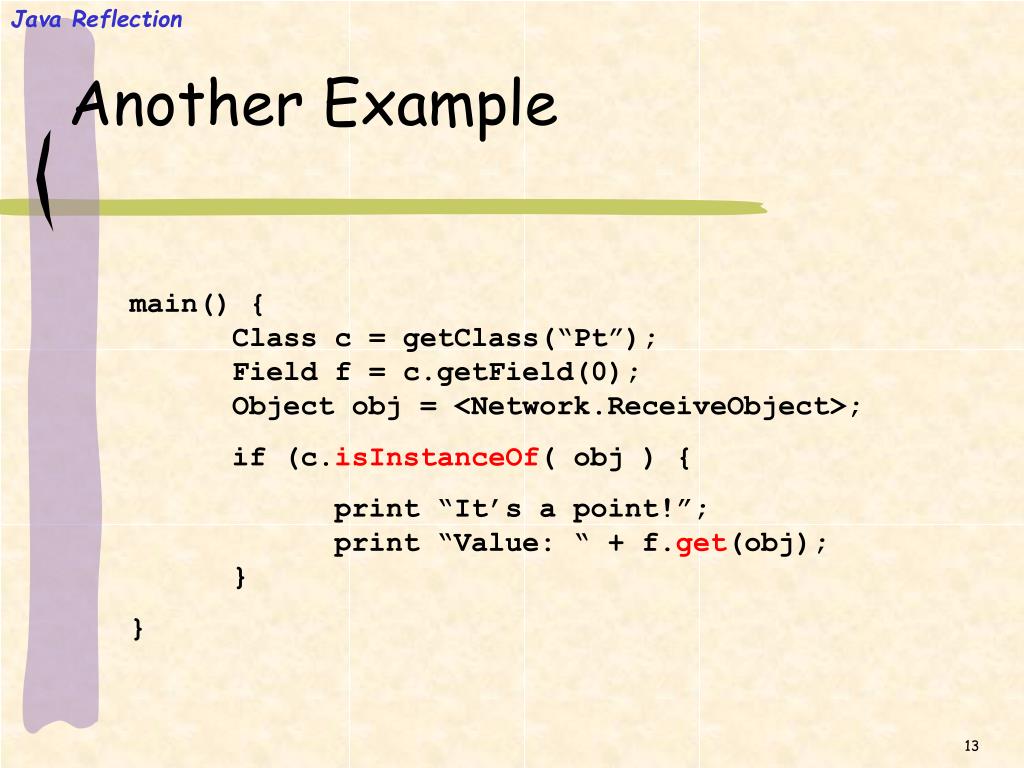
GetModifiers : Returns an integer that represents various characteristics that the formal parameter possesses. The example MethodParameterSpy would print the following for the method ExampleMethods.simpleMethod: public boolean ExampleMethods.simpleMethod(,int) Otherwise, this method synthesizes a name of the form arg N, where N is the index of the parameter in the descriptor of the method that declares the parameter.įor example, suppose you compiled the class ExampleMethods without specifying the -parameters compiler option.

If the parameter's name is present, then this method returns the name provided by the. GetName: Returns the name of the parameter. The MethodParameterSpy example uses the following methods from theĬlass object that identifies the declared type for the parameter. Public void ExampleMethods.genericMethod(T,) Public int ExampleMethods.varArgsMethod(.) Public boolean ExampleMethods.simpleMethod(,int) This command prints the following: Number of constructors: 1

Note: Remember to compile the example ExampleMethods with the -parameters compiler option: java MethodParameterSpy ExampleMethods The following command prints the formal parameter names of the constructors and methods of the classĮxampleMethods. The example also prints other information about each parameter.
Java reflection get parameter how to#
MethodParameterSpy example illustrates how to retrieve the names of the formal parameters of all constructors and methods of a given class. class file, and thus enable the Reflection API to retrieve formal parameter names, compile the source file with the -parameters option to the javac compiler. To store formal parameter names in a particular. In addition, some parameter names, such as secret or password, may expose information about security-sensitive methods. class files, and the Java Virtual Machine (JVM) would use more memory. In particular, these tools would have to handle larger. class files that contain parameter names. This is because many tools that produce and consume class files may not expect the larger static and dynamic footprint of. class files do not store formal parameter names by default. (The classesĮxecutable and therefore inherit the method Executable.getParameters.) However. You can learn more about this topic and other Java concepts in detail through Core Java online training.You can obtain the names of the formal parameters of any method or constructor with the method This article is to give a brief idea about the topic reflection in Java. Here, in order to get the metadata of the constructors existing within the Constructor.class, we have written a class. To get details about a class's variables, methods, and constructors, we need to create a class object.ĬlassNotFoundException
Java reflection get parameter full#
How to get full information about a class Returns an integer value representing the modifiers of the specified class that must be passed as the 'public static String to String (int I parameter, returning the access specifier for the specified class). Returns an array of interfaces that the defined class has implemented. This class uses to collect information about a specific modifier for entry. Besides, includes the access modifier, name, and parameter types of a constructor. This class uses to gather declarative information. Besides, this includes return type, name, parameter types, and type of exception. Then such as the access modifier of the process. This class uses to collect declarative information. This class uses to collect declarative information such as variable name, data type, access modifier, variable name, and meaning. The following is a list of different Java classes to implement reflection in the. The methods are used to collect the full metadata of a specific class.

The module includes multiple classes for the implementation of reflections. In Java training, one benefit of the reflection API is that it can also manipulate private members of the class. The Java Reflection API is used to modify classes and their members at runtime, including fields, methods, builders, etc. Java Reflection is the mechanism by which all a class's capabilities are evaluated and updated at runtime.


 0 kommentar(er)
0 kommentar(er)
